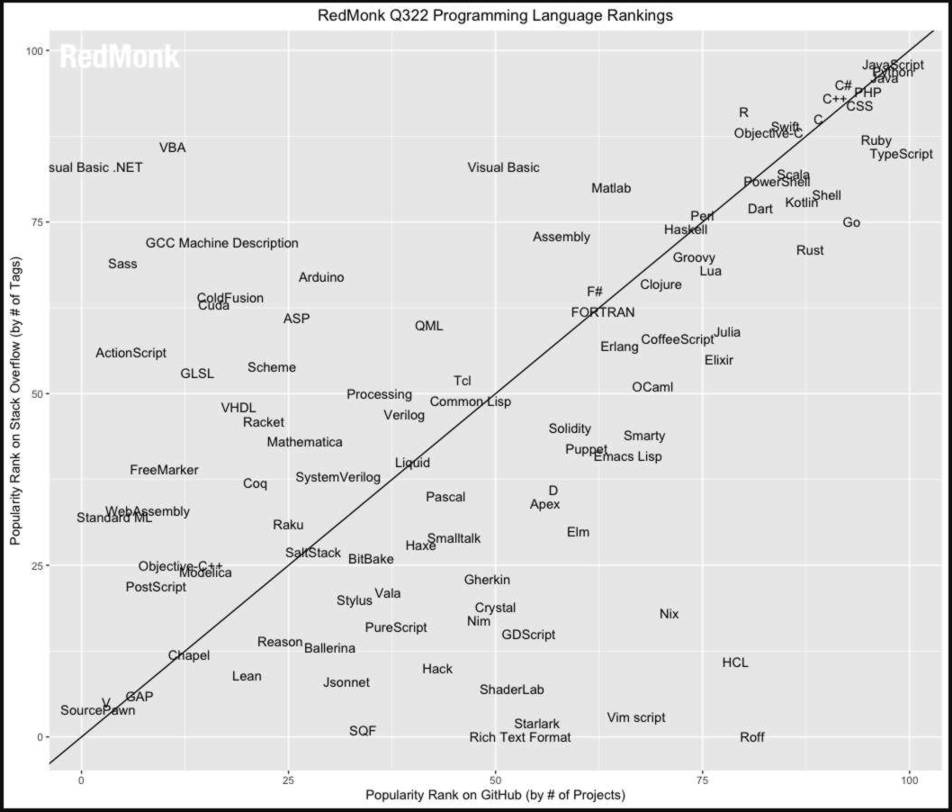| JavaScript Stays Top In Redmonk Rankings |
| Written by Janet Swift | |||
| Wednesday, 26 October 2022 | |||
|
The latest iteration of the RedMonk Language Rankings dated June 2022 shows no change at the top of the table, where JavaScript still reigns supreme, ahead of Python which retains second place, relegating Java to a close third. Lower down the ladder TypeScript and Kotlin are on the up while Scala is slipping down. Of all the programming language popularity contests the one conducted bi-annually since 2010 by Stephen O'Grady, the co-founder of RedMonk is the most convincing. O'Grady uses the methodology originally employed by "the dataists", Drew Conway and John Myles White in 2010 who plotted the correlation between the number of GitHub pull requests (an indication of language usage) and number of tags on Stack Overflow (an indication of level of interest). This not only seems intuitively to be a good approach, it produces consistent and believable results. To be included in this analysis, a language must be observable within both GitHub and Stack Overflow. The top ranking languages are those clustered in the top-right corner of the chart which means that they are simultaneously the most-discussed and the most-used.
Languages that appear above the line have a disproportionately large number of Stack Overflow tags in comparison to the number of GitHub pull requests. Those below the line are more used than talked about. In my report on the 2022 Stack Overflow Developer Survey, Shifts & Stability In Developer Landscape, I drew attention to the fact that JavaScript was, as usual, the most commonly used programming language commenting: One result that has been consistent for almost the entire history of the [Stack Overflow Developer Survey] survey is that JavaScript is the most commonly used programming language. You have to turn the clock back to 2013 to find in it very close second place to SQL. There's a similar story with regard to JavaScript's performance from RedMonk. It came top in 2012 and, apart from dropping below Java once in 2013 and sharing first place with Java in 2014 it has retained that position as this chart from Rachel Stephens shows: While long level lines predominate at the top of the chart look lower down and there has been considerable churn over the years, largely caused by "new" languages entering the rankings and propelling themselves upwards, displacing older languages such as Perl. But as O'Grady points out: it’s worth thinking about the age of the quote unquote up and coming languages. Go, for example, was released 13 years ago. Rust, 12; Dart and Kotlin 11; TypeScript 10; and even the relatively young Swift has been available for eight years now. He continues: It is not reasonable, of course, to expect a newly minted language to outperform in these rankings. They are accretive by nature, and therefore advantage long term usage and discussion. But anecdotally, we at RedMonk are not really running into many emergent programming languages with rare exceptions like Ballerina – five years old and ranked 87th. No language has moved by more than one position in this edition of the rankings. In a surprising come-back, Objective C which had fallen from 9th to 13th position between 2018 and 2020 rose to 12th. And after a year and a half in 16th position Go rebounded to 15th which it shares with Scala which is in a gentle decline. Kotlin, which entered the top 20 in Q1 of 2019 made its third upward step since then to reach 17th. Another language singled out for comment is TypeScript whose 10th birthday we recently reported. O'Grady writes: Long one of our most meteoric risers – and one of the canonical examples of why interoperability with popular existing languages can be a dramatic accelerant in usage and adoption – TypeScript had nevertheless stalled in our rankings. For the last three runs, TypeScript held its ground as our eighth most popular language in the survey. This quarter, however, it’s seventh – and tied with C++. We’ve pointed to many general factors with a link to programming language popularity in the past, among them: the aforementioned interoperability with popular existing languages; any increased availability of security-related features; and associations with popular frameworks or projects. TypeScript has had the good fortune to check all of those boxes, and there is little suggestion at present that the language is headed anywhere but up. The only real question is on what timeframe. TypeScript is, of course, a superset of JavaScript - think of it as the whizz kid of the family - and, as pointed out in TypeScript A Decade On, these days advances in TypeScript are shared with the JavaScript standards body, TC39, for the benefit of the wider JavaScript ecosystem.
More InformationThe RedMonk Programming Language Rankings: June 2022 Related ArticlesJavaScript Still Tops RedMonk's Rankings Language Ranking Almost Unchanged Over Time Why Do Some Languages Always Come Top? Python Ties With Java In RedMonk Language Rankings Watch the Rise and Fall of Programming Languages Language Popularity Retrospective The Dance Of The Programming Languages Kotlin Enters RedMonk's Top 20 To be informed about new articles on I Programmer, sign up for our weekly newsletter, subscribe to the RSS feed and follow us on Twitter, Facebook or Linkedin.
Comments
or email your comment to: comments@i-programmer.info |
|||
| Last Updated ( Tuesday, 01 November 2022 ) |




